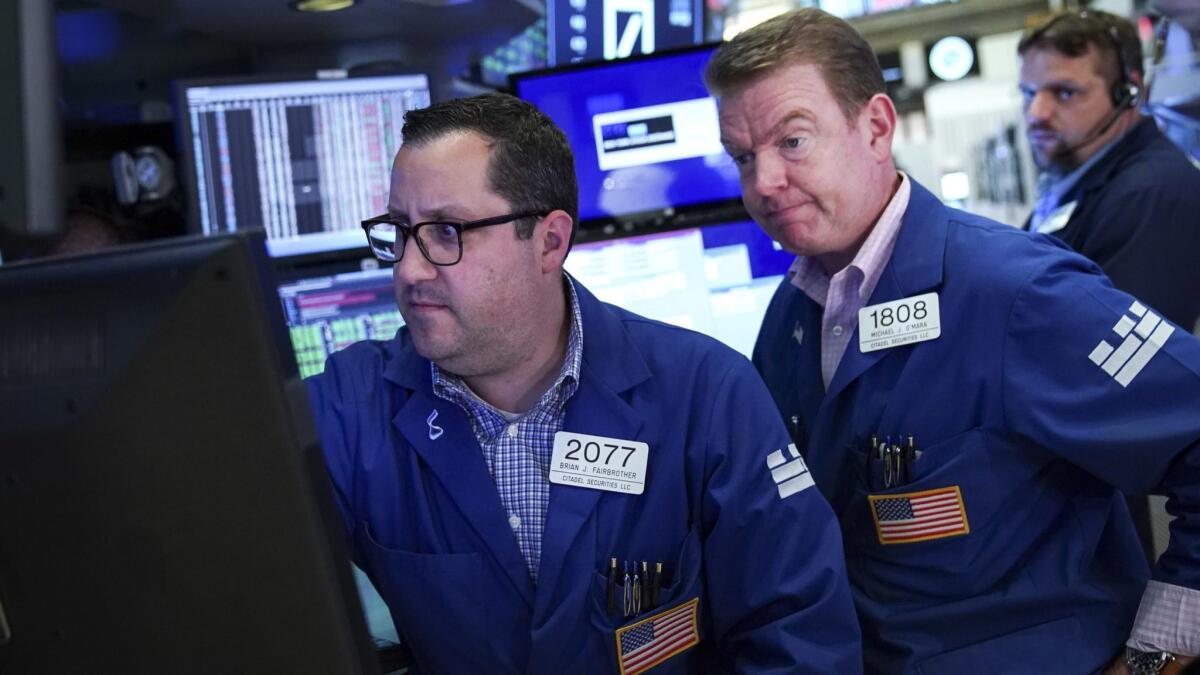Stocks have their best week since November

- Share via
Stocks on Wall Street turned the page on the market’s painful May by notching their best week since late November.
Stocks climbed for a fourth consecutive day Friday, capping a week of gains that reversed most of the losses they racked up last month when President Trump’s tariff threats escalated trade wars with China and Mexico.
The latest rally came as investors welcomed a report showing that the United States added fewer jobs than expected last month. The lackluster snapshot of hiring appeared to increase the odds that the Federal Reserve will cut interest rates in coming months.
Stocks surged earlier this week when Federal Reserve Chairman Jerome H. Powell said the central bank would “act as appropriate” if the trade disputes threatened U.S. economic expansion.
The jobs report could signal growing caution by businesses as economic growth slows and the United States engages in multiple trade conflicts.
“It’s a strange market right now,” said Gene Goldman, chief investment officer and director of research at Cetera Financial Group. “The markets are taking bad news as good news as reason to rally.”
The benchmark Standard & Poor’s 500 index climbed 29.85 points, or 1.1%, to 2,873.34 on Friday. It also notched its first weekly gain in five weeks and its biggest weekly gain since the week of Nov. 26.
The Dow Jones industrial average rose 263.28 points, or 1%, to 25,983.94.
The Nasdaq composite advanced 126.55 points, or 1.7%, to 7,742.10. The Russell 2000 index of smaller companies ticked up 10.85 points, or 0.7%, to 1,514.39.
Bond prices rose, pushing yields down, a sign that the market is worried about slower economic growth. The yield on the 10-year Treasury fell to 2.08% from 2.12%. That hurt banks, which rely on higher yields for profit from loan interest. Citigroup shares slid 1.2%.
Most other sectors climbed Friday. Technology stocks led the gainers. Microsoft rose 2.8% and Apple added 2.7%. Healthcare companies and internet stocks also posted big gains. Johnson & Johnson rose 1.4%, Facebook climbed 3%, and Twitter advanced 3.7%.
Retailers notched solid gains, led by Foot Locker, which climbed 3.3%. Ross Stores rose 3.1%.
Analysts are more confident that the Fed is closer to cutting interest rates as it gauges the latest weak employment data and downward revisions for previously reported data. The Labor Department said U.S. employers added just 75,000 jobs last month, and also said hiring in March and April was not quite as robust as originally reported.
“The stock markets are banking on the Fed’s ability to step in and save the day, as it has for much of the last decade,” said Cliff Hodge, director of investments for Cornerstone Wealth. He said the next rate cut could come as early as July.
While investors welcome the idea of a rate cut, such a move would suggest that the Fed is worried about the economy, which would not be good for the labor market, said Sameer Samana, senior global market strategist at Wells Fargo Investment Institute.
“We would view that as a sugar high as opposed to what the market really needs in order to make meaningful new highs driven by fundamentals,” Samana said. “Especially today ... our two cents for investors would be that the risk outweighs the reward.”
Investors were also optimistic about prospects for a U.S.-Mexico trade deal. The United States is poised to start imposing 5% tariffs on Mexican goods Monday, but both sides are negotiating, and media reports have suggested that the U.S. could consider delaying the tariffs.
Even with this week’s gains, several sectors of the stock market have a ways to go before they make up the losses they suffered last month as the trade disputes escalated.
The technology-heavy Nasdaq is still down 5.2% from its May 3 record high. Facebook and Alphabet, Google’s parent company, dragged down the internet-heavy communications sector over the last month. The sector is down 7.5% from its April 29 high, the biggest drop of any S&P sector. Consumer-focused stocks are down 4.6%, as a large portion of companies depend on China for significant revenue.
Meanwhile, investors have bought bonds, signaling their expectation that the Fed will cut rates. The yield on the 10-year Treasury is now 2.08%, down from 2.48% on April 7. Yields move inversely to bond prices.
On Friday, traders showed a hearty appetite for Beyond Meat, driving its shares up 39.3% after the maker of plant-based burgers beat Wall Street’s first-quarter financial forecasts. The company also gave investors a solid revenue forecast for the year. At $138.65 a share, Beyond Meat’s stock price is now more than five times its $25 IPO price.
Barnes & Noble rose 11.1% after the last of the big book retailers announced its sale to a hedge fund for $476 million. Elliott Management is expected to complete the buyout in the third quarter. The chain was blamed for the demise of independent bookstores and was ultimately laid low by the shift to online sales and Amazon’s rise.
Energy futures finished higher Friday. Benchmark U.S. crude rose 2.7% to settle at $53.99 a barrel. Brent crude oil, the international standard, rose 2.6% to $63.29 a barrel.
Wholesale gasoline rose 1.8% to $1.74 a gallon. Heating oil climbed 2% to $1.82 a gallon. Natural gas rose 0.6% to $2.34 per 1,000 cubic feet.
Gold rose 0.3% to $1,346.10 an ounce. Silver rose 0.8% to $15.03 an ounce. Copper fell 0.9% to $2.63 per pound.
The dollar fell to 108.15 yen from 108.44 yen. The euro strengthened to $1.1338 from $1.1273.
More to Read
Inside the business of entertainment
The Wide Shot brings you news, analysis and insights on everything from streaming wars to production — and what it all means for the future.
You may occasionally receive promotional content from the Los Angeles Times.









